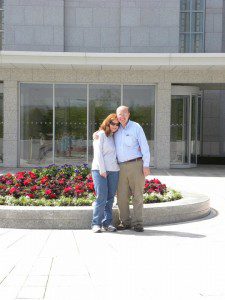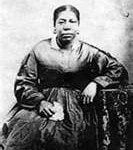Dear Ms. C:
I received this in an email from a Congolese friend, Aime Mbuyi, two years ago:
Long before I went into the Ghana temple as a missionary, I knew that it was the House of God. Two years earlier, my cousin had come to me and told me that he had had a discussion with some people who had just been in the USA. He said that these people had told him bad things about the Church and its temples. He told me many things against the Church and especially the temple. I was troubled. My spirit and mind were troubled. I was afraid. I remembered what the missionaries told me: “You can ask God to know if what we have taught is true.” I then prayed in my heart, meditated and prayed to know the truth. After a short while as I was in meditation, a feeling of peace, assurance and joy replaced the feelings of fear, doubt, confusion, and trouble in my heart. I was happy. I knew that I was headed in the right direction, and that the temples of the church are the very Houses of God. Later I testified of these things to my cousin, who finally decided to also join the Church.
I was at the Provo Temple’s dedication (1972), and later did baptisms for the dead there. When I walked into the temple to do those baptisms, my eyes teared. This was embarrassing, because nobody else was crying. I felt such love there, such a sense of the holy. I wanted to return–and did in 1979 for my endowment. Again, I felt love and something divine. It wasn’t particularly “weird” to me, though I know it has been for others. I suppose I was used to jumping into other worlds and simply learning about them. You never understand a new world with the first jump. You have to explore; you have to talk to the natives (in this case, those who go frequently); you have to focus on what you feel, and trust that you will grow in understanding.
I hold many memorable moments from my temple experiences over the years. The first happened when I went to the temple instead of to my best friend’s viewing. (She had been killed in a car crash.) At the veil, I heard a promise of resurrection. I wept. Another time, I sat beside my sister-from-another-mother as she waited to see representatives be baptized for her two sons, one who had died in a car accident, and the other who had been shot. I remember attending a family sealing with friends I had known in Venezuela. I had spoken to the mother many times in Puerto Ordaz about her son, who had died suddenly as a young teen–probably of an aneurysm. She was still grieving when we had spoken in Venezuela, and ten years had passed since I had seen her. I sat with others to watch the family be sealed, and saw another friend take the place of this lost son. I heard his name spoken as though he were there, and was reminded of the sacredness of the names we give our children. These names are part of our bond with them, the sounds we make when we see them, when we remember them.
I was a veil worker for fifteen years because they needed Spanish speakers. Then, when my children were grown, I accepted the invitation to be an ordinance worker. Now I get to work with newly called missionaries and with brides as they do what you will do on Saturday: go through the temple for the first time.
We workers wait until we see them come past the recommend desk. They’re not hard to identify. There’s usually a mother looking radiant, and a daughter, looking nervous. In your case, you will have a friend with you who will be beside you for most of the day.
You will be given your garments, which you’ve already purchased, and will be invited in to a particularly holy place of washing and anointing. You will be fully clothed, and the ordinance will be done symbolically. It’s an ancient ordinance, based on the washing of Aaron and his sons, and Aaron’s receiving his holy garments and his anointing (see Exodus 40). I love the fact that this ordinance was only for Aaron and his sons in ancient times, but now includes women. I love the blessings pronounced in this part of the temple.
Focus on the blessings and what they will mean to you and to your children.
After this, you will receive instruction before going to the endowment session. Your escort will be with you, and temple workers will be in the session room to be sure you are comfortable and at ease. You will get to see a movie with gorgeous footage of gardens, oceans, lava, animals, and humans. You will hear familiar stories. Know that we workers are there for you. We represent the angels you don’t see, but who see and know you. You are known and loved by many on earth and beyond. Let yourself feel that love. That is the primary purpose of the temple–to draw us nearer to God and to our families through undistracted love.
I have often gone to the temple seeking answers to prayers, particularly concerning my children. I went once when a daughter was making disastrous choices. This is what I wrote about that night:
Driving to the temple, I was intensely aware of how easy it was to get there, and had momentary thoughts of the great men I knew in Guatemala who had saved for years to make a week-long journey to the Mesa Temple by bus. I arrived within ten minutes. The big threat was that my emotions were so high I was afraid I’d weep at everything.
When I entered, I saw Elder Merrill Bateman, former BYU president and an emeritus GA, now the president of the Provo Temple. I know him because he was once the presiding authority over Genesis. I shook his hand and he smiled. “How are you?” he asked. I didn’t even feel like lying with “Fine thanks” and just said straight out, “My daughter is having trouble. I need to be in the temple. I need help.” He nodded and said, “You’ll get help tonight.”
As I went to get the name I would represent, I felt that it would be an important name. I represented a woman named Anastasia. It didn’t even occur to me until I was in the chapel that the name was indeed significant. Anastasia, from the Greek, means resurrection.
Towards the end of the ceremony, I felt a distinct impression: Give thanks for your daughter. I reviewed her life in my mind and thanked God for the privilege of being her mother. I knew that gratitude would have to be at the base of any conversation I had with her. Temptations to confront or accuse were muted, as were inclinations to blame myself for this new wrinkle or to indulge in self-pity. Those sorts of reactions would have been in the spirit of fear, not love.
You have almost certainly seen the celestial room at a temple open house, before the temple was dedicated. Some have expressed concern by the cost of the chandeliers. Though I live in a small house and easily move into third world conditions, the celestial room doesn’t bother me at all. It represents something far more brilliant than what those beaded lights can convey. But more than that, it is a room for all who have passed through the veil of the temple. No one is excluded.
I remember Rosalia Tum, from Patsun, Guatemala describing her experience in the temple. She spoke broken Spanish, since her native tongue was Cakchiquel, but told me how beautiful the temple was to her–and how touched she was by the fact that everyone was dressed the same. There were no racial or class distinctions.
When I started working at the temple, I told my husband that I was eager to get familiar with it. I am quite familiar with it now, but was recently introduced to new rooms I hadn’t seen before–waiting rooms for brides and grooms about to be sealed, a place of beauty where they can quietly converse with each other and then with the sealer before they are led to the room where they will be married.
I think of you in particular, my dear friend, and assume that you have ancestors who were enslaved. You will have the opportunity to represent them later and to speak their names, bringing them into the present. All things are present in the temple. The past disappears and we bless those who died long ago as though we were pulling them from the tomb and telling them that, as Isaiah 40:31 says, they–even they–“shall run and not be weary, and walk and not faint.”
There will always be touchstones of your faith–revelations you have had, miracles you’ve recognized, friendships, a future too glorious and hard to even imagine. The temple polishes those touchstones, and you can see the path a bit more clearly.
Feel the love there. Try to feel it from everywhere it’s coming–including from a red-headed temple worker in the Provo temple, who will be helping others like you as workers in Manhattan help you. Feel the presence of those you love who have passed on. You will be metaphorically robed in power, like the queen you are.
I love you.
Margaret












